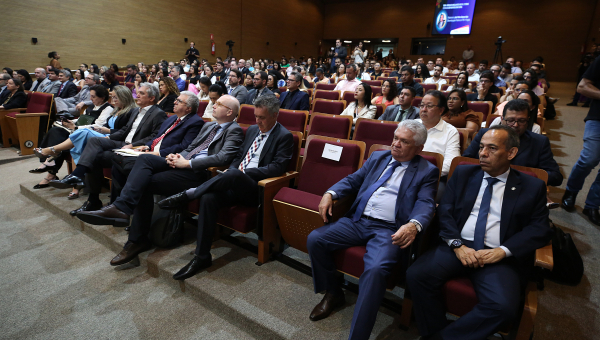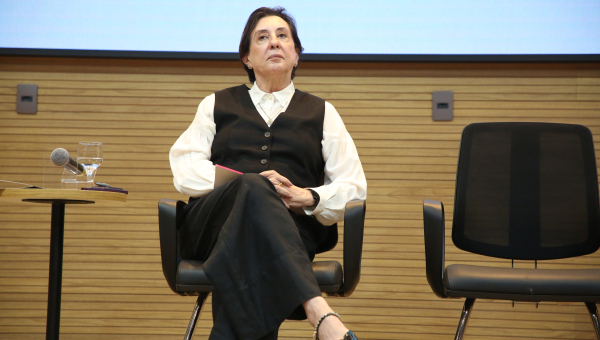
With the participation of magistrates from the state of Tocantins and other States, the forum on “Law and Health: focusing on the judicialization of health”, held on the afternoon of Monday (February 17th) in the auditorium of the Court of Justice of the State of Tocantins (TJTO), aimed to promote legal analysis of the rulings of the Federal Supreme Court (STF) on the topics 1.234 and 6 of the General Repercussion, with a focus on the practical implications for the supply of medicines by the State.
Court decisions relating to the supply of medicines and treatments have grown significantly, impacting both public management and the sustainability of the Unified Health System (SUS).
The event was promoted by the Judiciary of the state of Tocantins, through the management committee that deals with the policy of comprehensive health care for magistrates and civil servers, in partnership with the Superior School of the Judges of the State of Tocantins (Esmat), and it brought together health professionals, specialists and members of the Judiciary to discuss relevant topics on the role of the Judiciary in the area of health. 
At the opening of the programming, Ricardo Villas Bôas Cueva, minister of the Superior Court of Justice (STJ), addressed the Binding Precedents 60 and 61, as well as the topics 1.234 and 6. He highlighted the challenges facing the health system and the fundamental role of the Judiciary in mediating conflicts, defining rights and finding solutions that meet the needs of the population without compromising public management.
“The judicialization of health is a reflection of inequalities and the lack of access to essential treatments. The Judiciary must ensure that decisions are taken in a balanced way, based on technical and scientific criteria, to promote fair and equal access to health,” said the minister.
The second lecture of the event was given by the Federal Justice of the 4th Region of the TRF, João Pedro Gebran Neto; in a clear and accessible manner, the justice presented fundamental concepts that served as support for understanding the issues debated. Among the topics covered, he highlighted the concept of incorporated and non-incorporated medicines, as well as discussing the main guidelines for pharmaceutical assistance in Brazil.
The speaker began by reflecting on the role of Anvisa and Conitec, detailing their competencies, responsibilities and the obligations of the State to guarantee the adequate supply of medicines to the population. He also provided a critical analysis of how Natjus works, highlighting its importance in providing technical support to the Judiciary: “Natjus is where judges find the information and scientific evidence they need to make decisions.” He added: “The past event made me reflect on how judicial decisions directly impact public health and how we can improve our criteria to ensure a balance between the right to health and the sustainability of the system.”
Justice Angela Haonat, reading the curriculum vitae of the speaker, expressed her satisfaction at seeing the auditorium of the court full of participants interested in such a relevant and current topic, emphasizing the importance of the activity for improving judicial action in the health area.
Federal Judge Clênio Jair Schulze began his lecture by highlighting the satisfaction of returning to the state of Tocantins to debate such a relevant topic. He emphasized the power of the Brazilian health system, mentioning that many foreign patients come to the country in search of treatment, which demonstrates the quality of care offered.
Addressing the judicialization of health and social security, he explained the Supreme Court's understanding of the Supreme Court on the Precedents 60 and 61, warning about the risks of putting excessive pressure on the SUS, as it has already happened with the INSS. The judge also raised the issue of the indispensability of medicines and treatments granted by the courts, provoking reflection on the extent to which judicial decisions can go beyond what is essential to guarantee quality of life for patients.
During his explanation, he stressed the importance of critical analysis and methodology in the studies that support judicial decisions, emphasizing that the right to health must be accessible to all, without discrimination. He also addressed the need to avoid abusive litigation, warning of the impact of excessive judicialization on the balance of the health system.
“The current scenario points to a more restrictive interpretation of the right to health than in the past. For him, the SUS remains an extraordinary system, and health insurance companies play an essential role in providing care to millions of Brazilians. The future challenges us to reflect: our SUS is an extraordinary system, and health insurance companies provide essential services to more than 50 million people,” he said.
Judge Gil Correia, magistrate of the Court of Justice of the State of Tocantins, coordinated the table during the event.




















